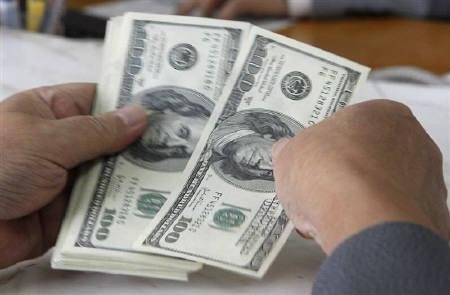US Dollar Debate: Fed Policy Deliberately Weakens Greenback, Currency Experts Say

The US Federal Reserve has a policy of weakening the dollar by printing more money than it needs to and has therefore sparked a currency war through competitive devaluation of the greenback, say foreign exchange experts.
Speaking at a debate in London about global foreign exchange markets named 'Currency Wars: Battle of the Weakest', experts tussled over whether the US was purposefully devaluing the dollar, in order to gain an advantage over other economies for its exports.
"It has always been the policy of the US to cheapen the dollar since 2009 and I think the speech by Ben Bernanke this week was a significant step in some form of admission of this. It is the first time ever Bernanke or Timothy Geithner directly admitted to weakening the greenback," said James Rickards, author of 'Currency Wars: The Making of the Next Global Crisis' and COO of JAC Capital Advisors.
"What should be noted is that QE3 is nothing like QE1 and QE2, where printing money was completed in order to stabilise the system by pumping through more liquidity; QE3 is something different altogether. The Fed wants a cheaper dollar and will continue to do so for a long time. All major economies manipulate their currency," he added, referring to the Fed's programme of bond buying known as quantitative easing.
While Alan Ruskin, managing director and global head of G-10 FX strategy at Deutsche Bank Securities remained "down the middle" on the debate, he did also emphasise that "the we can't say QE today is the same as QE1 as there are not very sharp inflows into the emerging markets as we saw three years ago."
At the end of September this year, Brazil's finance minister Guido Mantega reignited the issue over "currency wars" by saying that the US Federal Reserve's "protectionist" move to print more money, in a third round of quantitative easing, would "only have a marginal benefit [in the US] as there is already no lack of liquidity" and that it was aimed at boosting US exports.
On 14 October, when Fed Chairman Bernanke delivered his speech on the US monetary policy and the international implications, he directly addressed allegations, in one of the most comprehensive responses to that issue by saying that emerging markets have tools to deal with private money inflows and that private money inflows into these countries are related to a lot of things, not just interest rate differentials.
The Dollar Index, a measure of the value of the greenback against a basket of the six currencies of its biggest trading partners, has risen around 2.5 percent in the past 12 months, according to IntercontinentialExchange Inc. data.
Despite criticism's over the Fed's QE programmes and of course the weakening dollar, Antulio Bomfim, former senior economist at the Federal Reserve and now Senior managing director and co-head of monetary policy insights at Macroeconomic Advisors said that he thoroughly disagreed with this assumption and that the cheapened greenback had unintended consequences.
Since 2010, Brazil's Mantega has openly criticised the US for its monetary policy.
Earlier this year, he stated at a G20 meeting that the country had a "large arsenal of instruments to prevent an excessive appreciation of the Brazilian currency."
The tools he described, included occasionally holding swap auctions, at which investors exchange dollar-linked bonds for paper indexed to domestic interest rates, as well as frequent purchases of spot dollars and dollars for forward delivery by the central bank.
Meanwhile, at the same debate in London, Rickards, Bomfim and Ruskin discussed the fate of the world's reserve currency and whether the US dollar will be relieved of this title in 10 years' time.
Rickards believes that a gold-backed instrument, such as a Special Drawing Right (SDR), a reserve asset issued by the International Monetary Fund (IMF), would replace the US dollar as the reserve currency in ten years.
Bomfin and Ruskin both agreed that years ago, they would have pegged the Euro to that status however the depreciation of the currency following the sovereign debt crisis has quashed this and that the US dollar will remain as world reserve currency in a decades time.
© Copyright IBTimes 2025. All rights reserved.






















